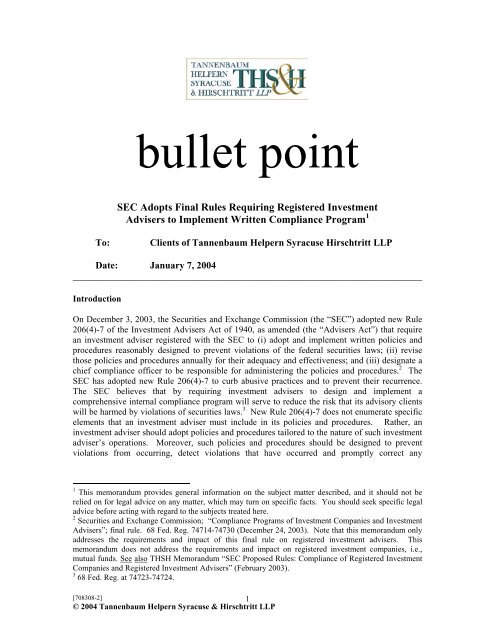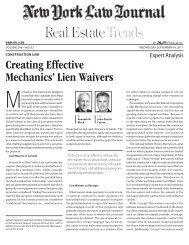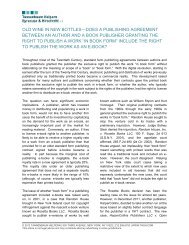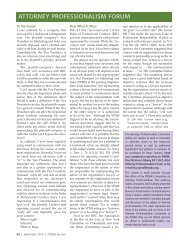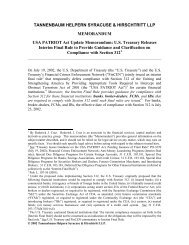SEC Adopts Final Rules Requiring Registered Investment Advisers ...
SEC Adopts Final Rules Requiring Registered Investment Advisers ...
SEC Adopts Final Rules Requiring Registered Investment Advisers ...
You also want an ePaper? Increase the reach of your titles
YUMPU automatically turns print PDFs into web optimized ePapers that Google loves.
ullet point<br />
<strong>SEC</strong> <strong>Adopts</strong> <strong>Final</strong> <strong>Rules</strong> <strong>Requiring</strong> <strong>Registered</strong> <strong>Investment</strong><br />
<strong>Advisers</strong> to Implement Written Compliance Program 1<br />
To:<br />
Clients of Tannenbaum Helpern Syracuse Hirschtritt LLP<br />
Date: January 7, 2004<br />
________________________________________________________________________<br />
Introduction<br />
On December 3, 2003, the Securities and Exchange Commission (the “<strong>SEC</strong>”) adopted new Rule<br />
206(4)-7 of the <strong>Investment</strong> <strong>Advisers</strong> Act of 1940, as amended (the “<strong>Advisers</strong> Act”) that require<br />
an investment adviser registered with the <strong>SEC</strong> to (i) adopt and implement written policies and<br />
procedures reasonably designed to prevent violations of the federal securities laws; (ii) revise<br />
those policies and procedures annually for their adequacy and effectiveness; and (iii) designate a<br />
chief compliance officer to be responsible for administering the policies and procedures. 2 The<br />
<strong>SEC</strong> has adopted new Rule 206(4)-7 to curb abusive practices and to prevent their recurrence.<br />
The <strong>SEC</strong> believes that by requiring investment advisers to design and implement a<br />
comprehensive internal compliance program will serve to reduce the risk that its advisory clients<br />
will be harmed by violations of securities laws. 3 New Rule 206(4)-7 does not enumerate specific<br />
elements that an investment adviser must include in its policies and procedures. Rather, an<br />
investment adviser should adopt policies and procedures tailored to the nature of such investment<br />
adviser’s operations. Moreover, such policies and procedures should be designed to prevent<br />
violations from occurring, detect violations that have occurred and promptly correct any<br />
1 This memorandum provides general information on the subject matter described, and it should not be<br />
relied on for legal advice on any matter, which may turn on specific facts. You should seek specific legal<br />
advice before acting with regard to the subjects treated here.<br />
2 Securities and Exchange Commission; “Compliance Programs of <strong>Investment</strong> Companies and <strong>Investment</strong><br />
<strong>Advisers</strong>”; final rule. 68 Fed. Reg. 74714-74730 (December 24, 2003). Note that this memorandum only<br />
addresses the requirements and impact of this final rule on registered investment advisers. This<br />
memorandum does not address the requirements and impact on registered investment companies, i.e.,<br />
mutual funds. See also THSH Memorandum “<strong>SEC</strong> Proposed <strong>Rules</strong>: Compliance of <strong>Registered</strong> <strong>Investment</strong><br />
Companies and <strong>Registered</strong> <strong>Investment</strong> <strong>Advisers</strong>” (February 2003).<br />
3 68 Fed. Reg. at 74723-74724.<br />
[708308-2]<br />
1<br />
© 2004 Tannenbaum Helpern Syracuse & Hirschtritt LLP
violations that have occurred. 4 Failure to implement adequate policies and procedures will<br />
constitute a violation of the <strong>SEC</strong>’s rules. 5<br />
New Rule 206(4)-7 will be effective on February 5, 2004. The compliance date of new Rule<br />
206(4)-7 and amendments to the <strong>Advisers</strong> Act is October 5, 2004. 6 By October 5, 2004, a<br />
registered investment adviser must have adopted a written compliance program that addresses the<br />
provisions of the <strong>Advisers</strong> Act that apply to such investment advisers and designated a chief<br />
compliance officer. 7 Moreover, the first annual review of such an investment adviser’s<br />
compliance program must be completed no later than eighteen months after adoption and<br />
approval of its compliance program. 8<br />
Who Must Comply with New Rule 206(4)-7?<br />
New Rule 206(4)-7 applies only to investment advisers registered with the <strong>SEC</strong>. 9<br />
New Rule 206(4)-7 does not apply to unregistered investment advisers and to advisers that are<br />
registered with their respective state regulatory authority. As such, hedge fund managers that are<br />
exempt from federal and state registration are not required to adopt a written compliance program<br />
pursuant to new Rule 206(4)-7. 10<br />
What Must a <strong>Registered</strong> <strong>Investment</strong> Adviser Do under New Rule 206(4)-7?<br />
A. Written Policies and Procedures<br />
Under new Rule 206(4)-7(a), it is unlawful for a registered investment adviser to provide<br />
investment advice unless such an investment adviser has adopted and implemented written<br />
policies and procedures designed to prevent violations of the <strong>Advisers</strong> Act and the rules adopted<br />
by the <strong>SEC</strong> under the <strong>Advisers</strong> Act by the investment adviser or any of its supervised persons. 11<br />
An investment adviser must consider its fiduciary and regulatory obligations under the <strong>Advisers</strong><br />
Act and then formalize policies and procedures to address them.<br />
According to the <strong>SEC</strong>, in designing the policies and procedures, an investment adviser should<br />
first identify conflicts and other compliance factors that create risk exposure for the adviser and<br />
4 68 Fed. Reg. at 74716.<br />
5 68 Fed. Reg. at 74715.<br />
6 68 Fed. Reg. at 74723.<br />
7 68 Fed. Reg. at 74723.<br />
8 68 Fed. Reg. at 74723.<br />
9 68 Fed. Reg. at 74715.<br />
10 Unregistered investment advisers that rely on the exemption from registration pursuant to Section<br />
203(b)(3) of the <strong>Advisers</strong> Act should nevertheless review the requirements under new Rule 206(4)-7 in<br />
light of the <strong>SEC</strong> staff’s recommendation to revise Section 203(b)(3) of the <strong>Advisers</strong> Act so that hedge fund<br />
managers that rely on Section 203(b)(3) would be required to register with the <strong>SEC</strong> and therefore would be<br />
required to comply with new Rule 206(4)-7 as well. See Part VII.A. of the “Implications of the Growth of<br />
Hedge Funds,” Staff Report to the United States Securities and Exchange Commission (September 2003)<br />
(the “<strong>SEC</strong> Staff Hedge Fund Report”).<br />
11 New Rule 206(4)-7(b) of the <strong>Advisers</strong> Act. The term “supervised persons” means “any partner, officer,<br />
director (or other person occupying a similar status or performing similar functions), or employee of an<br />
investment adviser, or other person who provides investment advice on behalf of the investment adviser<br />
and is subject to the supervision and control of the investment adviser.” See Section 202(a)(25) of the<br />
<strong>Advisers</strong> Act.<br />
[708308-2]<br />
2<br />
© 2004 Tannenbaum Helpern Syracuse & Hirschtritt LLP
its clients in light of the adviser’s particular operations and then design policies and procedures<br />
that address those risks. 12 At a minimum, the <strong>SEC</strong> has stated that the following issues should be<br />
addressed to the extent that they are relevant to an investment adviser:<br />
• Portfolio management processes, including allocation of investment opportunities among<br />
clients and consistency of portfolios with clients’ investment objectives, disclosures by the<br />
investment adviser and applicable regulatory restrictions; 13<br />
• Trading practices, including procedures by which the investment adviser satisfies its best<br />
execution obligation, uses client brokerage to obtain research and other services (soft dollar<br />
arrangements) and allocates aggregated trades among clients; 14<br />
• Proprietary trading of the investment adviser and personal trading activities of supervised<br />
persons; 15<br />
• The accuracy of disclosures made to investors, clients and regulators, including account<br />
statements and advertisements; 16<br />
• Safeguarding of client assets from conversion or inappropriate use by advisory personnel; 17<br />
• The accurate creation of required records and their maintenance in a manner that secures<br />
them from unauthorized alteration or use and protects them from untimely destruction; 18<br />
• Marketing advisory services, including the use of solicitors; 19<br />
12 68 Fed. Reg. at 74716.<br />
13 A registered investment adviser that votes proxies on behalf of its clients is required to adopt and to<br />
implement written policies and procedures that are reasonably designed to ensure that the investment<br />
adviser votes proxies in the best interest of its clients. See Rule 206(4)-6 of the <strong>Advisers</strong> Act.<br />
14 An investment adviser that engages in the use of soft dollars (whether within the exceptions under<br />
Section 28(e) of the Securities Exchange Act of 1934 or outside Section 28(e)) is required to disclose its<br />
soft dollar practices to clients and should internally document and periodically review how it allocates soft<br />
dollars for research and other services to demonstrate its compliance with the best execution obligations.<br />
See Securities and Exchange Act Release No. 23170 (Apr. 23, 1986).<br />
15 Pursuant to Section 204A of the <strong>Advisers</strong> Act, registered investment advisers are required to establish,<br />
maintain, and enforce written policies and procedures reasonably designed to prevent the investment<br />
adviser and any of its associated persons from misusing material, nonpublic information. Also, pursuant to<br />
Rule 204-2(a)(12) of the <strong>Advisers</strong> Act, a registered investment adviser is required to maintain policies and<br />
procedures that address, report, and review the personal securities transactions of its employees and their<br />
family members.<br />
16 The advertising of a registered investment adviser’s services and its performance results are governed by<br />
Rule 206(4)-1 of the <strong>Advisers</strong> Act and by a series of <strong>SEC</strong> no-action letters. See e.g. Gallagher and<br />
Associates, Ltd. (July 10, 1995) (prohibition on testimonials); Clover Capital Management, Inc. (Oct. 28,<br />
1986) (performance advertisement); <strong>Investment</strong> Company Institute (Aug. 24, 1987) (performance<br />
advertisement must be net of fees); JP Morgan <strong>Investment</strong> Management, Inc. (May 7, 1996) (model fees);<br />
Association for Inv. Management & Research (Dec. 18, 1996) (accounts to include in determining actual<br />
performance); Horizon Asset Mgmt, LLC (Sept. 13, 1996) (portability of past performance); and Great<br />
Lake Advisors, Inc. (Apr. 3, 1992) (portability of past performance).<br />
17 A registered investment adviser deemed to have custody is required in general to (i) maintain cash and<br />
securities with a qualified custodian and (ii) distribute account statements to each of its clients pursuant to<br />
Rule 206(4)-2 of the <strong>Advisers</strong> Act.<br />
18 In general, a registered investment adviser is required to maintain books and records with respect to its<br />
advisory services for a period of five years (the first two years on-site at the adviser’s office) pursuant to<br />
Rule 204-2(e)(1) of the <strong>Advisers</strong> Act. The types of documents to be maintained are described in Rule<br />
204-2(a)(1)-(16), Rule 204-2(b), Rule 204-2(c), and Rule 204-2(e)(2) of the <strong>Advisers</strong> Act. It is permissible<br />
to maintain such records in electronic format provided that the investment adviser can furnish a copy to the<br />
<strong>SEC</strong> within twenty-four hours. See Rule 204-2(g) of the <strong>Advisers</strong> Act; Release No. IA-1945 (May 24,<br />
2001).<br />
[708308-2]<br />
3<br />
© 2004 Tannenbaum Helpern Syracuse & Hirschtritt LLP
• Processes to value client holdings and assess fees based on those valuations;<br />
• Safeguards for the privacy protection of client records and information; 20 and<br />
• Business continuity plans. 21<br />
New Rule 206(4)-7 does not require an investment adviser to consolidate all compliance policies<br />
and procedures into a single document. 22 As such, it is permissible for an investment adviser to<br />
maintain several written compliance manuals in which each manual addresses a specific aspect of<br />
the <strong>Advisers</strong> Act. Furthermore, an investment adviser is not required to memorialize every action<br />
that must be taken in order to remain in compliance with the <strong>Advisers</strong> Act. 23<br />
B. Annual Review<br />
New Rule 206(4)-7(b) requires a registered investment adviser to review its policies and<br />
procedures annually to determine their adequacy and effectiveness of implementation. 24<br />
Moreover, an investment adviser should document it annual review. 25 When reviewing its<br />
compliance program, an investment adviser should consider any compliance matters that arose in<br />
the previous year, any changes in its business activities or any changes to the Adviser Act that<br />
may require a revision to its policies and procedures. 26<br />
Note that it is neither mandated nor implied that a third-party such as an auditor or other service<br />
provider conduct the annual review.<br />
C. Designation of Chief Compliance Officer<br />
New Rule 206(4)-7(c) requires a registered investment adviser to designate a chief compliance<br />
officer to administer its compliance policies and procedures. 27 The chief compliance officer is to<br />
be identified on Form ADV, Part I, Schedule A, Item 2(a). 28 The compliance officer should be<br />
19 A registered investment adviser that uses a third-party to solicit clients, i.e., a finder, must comply with<br />
the procedures set forth in Rule 206(4)-3 of the <strong>Advisers</strong> Act.<br />
20 A registered investment adviser is required to adopt a written policy that describes how such an<br />
investment adviser maintains and protects the nonpublic personal information of its natural person clients<br />
and to provide such clients with a written notice of the investment adviser’s privacy policy pursuant to<br />
Regulation S-P.<br />
21 Interestingly, the adoption of a business continuity plan is now a fiduciary obligation even though this<br />
requirement is not explicitly stated in the <strong>Advisers</strong> Act. According to the <strong>SEC</strong>, an investment adviser’s<br />
fiduciary obligation includes the obligation to take steps to protect its clients’ interests from being placed at<br />
risk as a result of such an investment adviser’s inability to provide advisory services after a natural disaster<br />
or the death or the owner or key personnel. See 68 Fed. Reg. at 74716, note 22.<br />
22 68 Fed. Reg. at 74716.<br />
23 68 Fed. Reg. at 74716.<br />
24 New Rule 206(4)-7(b) of the <strong>Advisers</strong> Act. Note that an investment adviser may review its compliance<br />
program more frequently. According to the <strong>SEC</strong>, “[a]lthough the rule requires only annual reviews,<br />
advisers should consider the need for interim reviews in response to significant compliance events, changes<br />
in business arrangements, and regulatory developments. 68 Fed. Reg. at 74720.<br />
25 Any records documenting the annual review must be maintained for at least five years after the end of<br />
the investment adviser’s fiscal year in which the review was conducted, the first two years on-site at the<br />
investment adviser’s office. See new Rule 204-2(a)(17)(ii) of the <strong>Advisers</strong> Act.<br />
26 68 Fed. Reg. at 74720.<br />
27 New Rule 206(4)-7(c) of the <strong>Advisers</strong> Act.<br />
28 Each registered investment adviser and each applicant for registration as an adviser is to identify a single<br />
compliance officer. 68 Fed. Reg. at 74720, note 72 (emphasis in original text).<br />
[708308-2]<br />
4<br />
© 2004 Tannenbaum Helpern Syracuse & Hirschtritt LLP
competent and knowledgeable regarding the <strong>Advisers</strong> Act and should be empowered with full<br />
responsibility and authority to develop and enforce appropriate policies and procedures for the<br />
firm. 29 The compliance officer is to be an employee of the investment adviser and is to have<br />
sufficient seniority and authority within the investment adviser’s organization to compel others to<br />
adhere to the compliance policies and procedures. Accordingly, an investment adviser can not<br />
hire a third-party such as a service provider to serve as the chief compliance officer.<br />
Note that the title of chief compliance officer does not, in and of itself, carry supervisory<br />
responsibilities. According to the <strong>SEC</strong>, a chief compliance officer appointed in accordance with<br />
new Rule 206(4)-2 would not necessarily be subject to a sanction for failure to supervise other<br />
advisory personnel. 30 Also, if a compliance officer does have supervisory responsibilities, such a<br />
compliance officer can continue to rely on the defense provided for in Section 203(e)(6) of the<br />
<strong>Advisers</strong> Act which provides that a person shall not be deemed to have failed to reasonably<br />
supervise another person if: (i) the adviser had adopted procedures reasonably designed to<br />
prevent and detect violations of the federal securities laws; (ii) the adviser had a system in place<br />
for applying the procedure; and (iii) the supervising person had reasonably discharged his<br />
supervisory responsibilities in accordance with the procedures and had no reason to believe the<br />
supervised person was not complying with the procedures. 31<br />
D. Recordkeeping<br />
The <strong>SEC</strong> added new Rule 204-2(a)(17) to require registered investment advisers to maintain a<br />
copy of the investment adviser’s policies and procedures formulated pursuant to new Rule<br />
206(4)-2 32 and to maintain any records documenting their annual review. 33 Such records may be<br />
maintained electronically. 34 According to the <strong>SEC</strong>, these new recordkeeping requirements will<br />
assist the <strong>SEC</strong>’s examination staff in determining whether the investment adviser is adhering to<br />
new Rule 206(4)-7 and in identifying weaknesses in the compliance program. 35<br />
Impact on <strong>Registered</strong> <strong>Investment</strong> <strong>Advisers</strong> that Are Hedge Fund Managers<br />
A. Specific Issues of Concern by the <strong>SEC</strong><br />
<strong>Registered</strong> investment advisers that are hedge fund managers will have to craft their compliance<br />
program to address specific concerns raised by the <strong>SEC</strong> that the <strong>SEC</strong> considers to be particular to<br />
hedge funds. Such particular concerns include the following:<br />
1. Conflicts of Interest<br />
According to the <strong>SEC</strong>, the compliance program must address portfolio management processes,<br />
including the allocation of investment opportunities among clients and consistency of portfolios<br />
with clients’ investment objectives, disclosures by the investment adviser and applicable<br />
regulatory restrictions. 36 What this requirement likely means to registered hedge fund managers<br />
29 68 Fed. Reg. at 74720.<br />
30 68 Fed. Reg. at 74720, note 73.<br />
31 68 Fed. Reg. at 74720, note 73.<br />
32 New Rule 204-2(a)(17)(i) of the <strong>Advisers</strong> Act.<br />
33 New Rule 204-2(a)(17)(ii) of the <strong>Advisers</strong> Act.<br />
34 See Rule 204-2(g) of the <strong>Advisers</strong> Act.<br />
35 68 Fed. Reg. at 74723.<br />
36 68 Fed. Reg. at 74716.<br />
[708308-2]<br />
5<br />
© 2004 Tannenbaum Helpern Syracuse & Hirschtritt LLP
is that the fund manager must identify and disclose any conflicts of interest it has and possibly<br />
document the rationale for allocating investments in favor of one account or hedge fund over<br />
another managed account and/or hedge fund. The <strong>SEC</strong> staff believes that hedge funds “often<br />
have substantial conflicts of interest, both with the hedge fund and with other non-hedge fund<br />
investors.” 37 By disclosing conflicts of interest to its clients, an investment adviser may discharge<br />
its fiduciary obligations. However, the <strong>SEC</strong> staff feels that the disclosures currently being<br />
provided to some hedge fund investors could be improved. In particular, the <strong>SEC</strong> staff is<br />
concerned with the side-by-side management of client accounts. 38 Furthermore, the <strong>SEC</strong> staff<br />
believes that the relationship between a hedge fund and the investment adviser incorporates a<br />
number of significant incentives that have the potential to motivate an investment adviser to favor<br />
its hedge fund client over its other clients and may result in preferential allocations in favor of the<br />
hedge fund. 39<br />
Despite the <strong>SEC</strong>’s staff’s concerns that hedge fund managers may be allocating favorable<br />
investments to its hedge fund’s portfolio at the expense of its other managed accounts, the <strong>SEC</strong><br />
has yet to issue guidance as to how to resolve conflicts of interest. As such, what the <strong>SEC</strong><br />
expects from registered investment advisers that are hedge fund managers with respect to<br />
disclosing and resolving conflicts of interest currently remains unclear.<br />
2. Valuation<br />
According to the <strong>SEC</strong>, a registered investment adviser’s compliance program must address the<br />
processes of valuing client holdings. 40 What this requirement likely means to registered hedge<br />
fund managers is that the fund manager must adopt a policy that details how such an adviser<br />
valuates the positions in the hedge funds portfolio and perhaps hire an independent third party to<br />
serve a check with respect to the valuation of a fund’s portfolio. The <strong>SEC</strong> staff feels that the lack<br />
of independent checks on a hedge fund adviser’s valuation of a hedge fund’s portfolio is among<br />
the most serious concerns the <strong>SEC</strong> staff has identified in the course of their investigation of the<br />
hedge fund industry. 41 Moreover, the <strong>SEC</strong> staff is particularly concerned with the valuation of<br />
illiquid securities in a hedge fund’s portfolio. 42 Furthermore, the <strong>SEC</strong> staff has found that hedge<br />
fund advisers have broad discretion to value securities and often exercise ultimate judgement over<br />
valuation. 43 In light of the absence of any form of independent oversight over hedge fund<br />
pricing, the quality and fairness of the prices of a hedge fund’s portfolio seems suspect from the<br />
perspective of the <strong>SEC</strong> staff.<br />
What the <strong>SEC</strong> expects from registered investment advisers that are hedge fund managers with<br />
respect to valuation remains an open question. The <strong>SEC</strong> has yet to issue any concrete guidelines<br />
on valuation despite the <strong>SEC</strong> staff’s critical commentary of hedge fund valuation. Until the <strong>SEC</strong><br />
issues proposed rules or staff guidance on how hedge funds are to value their portfolio, there will<br />
be uncertainty as to how to draft policies and procedures that address a hedge fund’s valuation.<br />
<strong>Registered</strong> fund managers should strongly consider requesting the <strong>SEC</strong> for greater guidance so<br />
that the <strong>SEC</strong> can clarify its expectations on valuations from hedge fund managers.<br />
37 See Part VI.E. of the <strong>SEC</strong> Staff Hedge Fund Report.<br />
38 See Part VI.E. of the <strong>SEC</strong> Staff Hedge Fund Report.<br />
39 See Part VI.E. of the <strong>SEC</strong> Staff Hedge Fund Report.<br />
40 68 Fed. Reg. at 74716.<br />
41 See Part VI.B. of the <strong>SEC</strong> Staff Hedge Fund Report.<br />
42 See Parts IV.G. and VI.B. of the <strong>SEC</strong> Staff Hedge Fund Report.<br />
43 See Parts IV.G. and VI.B. of the <strong>SEC</strong> Staff Hedge Fund Report.<br />
[708308-2]<br />
6<br />
© 2004 Tannenbaum Helpern Syracuse & Hirschtritt LLP
B. Other Compliance Issues Hedge Fund Managers Should Note<br />
<strong>Registered</strong> investment advisers that are hedge fund managers should also note the following when<br />
drafting their compliance program:<br />
1. Custody Rule<br />
Under Rule 206(4)-2 of the <strong>Advisers</strong> Act (the Custody Rule), the client is each beneficial owner<br />
in the fund, and, as such, each investor in the fund is to receive the account statement. 44<br />
2. Advertising<br />
While the compliance program will have to address advertising with respect to the <strong>Advisers</strong> Act,<br />
a registered investment adviser operating a hedge fund is also subject to additional rules and <strong>SEC</strong><br />
no-action letters that govern the advertising of privately placed pooled investment vehicles. 45<br />
Accordingly, it is advisable that a hedge fund manager’s compliance program include restrictions<br />
on its ability to advertise its hedge fund(s).<br />
Future Developments<br />
In the near future, registered investment advisers should expect to adopt an anti-money<br />
laundering program pursuant to Section 352 of the Uniting and Strengthening America by<br />
Providing Appropriate Tools Required to Intercept and Obstruct Terrorism Act of 2001 (the<br />
“USA PATRIOT Act”). 46 The proposed rule would require investment advisers to conduct due<br />
diligence on certain managed accounts and pooled investment vehicles. <strong>Investment</strong> advisers<br />
would be required to: (i) establish and implement policies, procedures and internal controls<br />
reasonably designed to detect and to prevent money laundering and terrorist financing; (ii)<br />
provide for independent testing for compliance, (iii) designate a person or persons responsible for<br />
implementing and monitoring the anti-money laundering program; and (iv) provide for ongoing<br />
employee training. 47<br />
Currently, the <strong>SEC</strong> has not released any <strong>SEC</strong> staff guidance as to how to conduct an internal<br />
review of an investment adviser’s compliance program. Not knowing what areas to review may<br />
render the annual review obligation to become a counter-productive exercise, especially if<br />
investment advisers are reviewing areas that the <strong>SEC</strong> does not consider to be critical. Since the<br />
compliance date is not until October 5, 2004 and annual reviews are not to be conducted until<br />
2005, the investment advisory industry should consider requesting the <strong>SEC</strong> for a <strong>SEC</strong> staff<br />
release as to what areas should be considered when conducting an annual review similar to the<br />
44 See Rule 206(4)-2(a)(3)(iii) of the <strong>Advisers</strong> Act. An alternate provision to comply with the obligation to<br />
distribute account statements to clients under the custody rule is available to registered investment advisers<br />
of pooled investment vehicles such as hedge funds. See Rule 206(4)-2(b)(3) of the <strong>Advisers</strong> Act.<br />
45 See Rule 501(c) of the <strong>Investment</strong> Company Act of 1940, as amended. See e.g. Royce Exchange Fund<br />
(Aug. 28, 1996); In the Matter of Harry Harootunian and Professional Planning & Technologies, Inc. and<br />
In the Matter of Robert Testa, Exchange Act Release No. 32981 (Sept. 29, 1993); In the Matter of Kenman<br />
Corp., Exchange Act Release No. 21962 (Apr. 19, 1985); Santa Barbara Securities (Apr. 8, 1983); and<br />
Woodtrails-Seattle Limited (Aug. 9, 1982).<br />
46 Financial Crimes Enforcement Network; Anti-Money Laundering Programs for <strong>Investment</strong> <strong>Advisers</strong>;<br />
proposed rules; 68 Fed. Reg. 23646-23653 (May 5, 2003).<br />
47 68 Fed. Reg. at 23648.<br />
[708308-2]<br />
7<br />
© 2004 Tannenbaum Helpern Syracuse & Hirschtritt LLP
self-audit guide that the National Futures Association provides to its members. 48 Despite the<br />
<strong>SEC</strong>’s statements that there is no “one-size fits all” compliance program, by setting forth what is<br />
required by all registered investment advisers and by describing what should be reviewed under<br />
each provision of the <strong>Advisers</strong> Act, investment advisers will have a better grasp as to what to<br />
assess with respect to provisions of the <strong>Advisers</strong> Act applicable to such an adviser’s operations.<br />
<strong>Final</strong>ly, the registered investment adviser industry should note that if the <strong>SEC</strong> finds that new Rule<br />
206(4)-7 fails to adequately strengthen the compliance program of investment advisers, the <strong>SEC</strong><br />
may reconsider requiring the earlier proposal of investment advisers obtaining compliance<br />
reviews from third party compliance efforts. 49<br />
* * * * * * *<br />
If you have any questions or comments regarding compliance with new Rule 206(4)-7 of the<br />
<strong>Advisers</strong> Act or need assistance in drafting a compliance program, please feel free to contact:<br />
Michael G. Tannenbaum<br />
(212) 508-6701<br />
tannenbaum@tanhelp.com<br />
Ricardo W. Davidovich<br />
(212) 508-6710<br />
davidovich@tanhelp.com<br />
Roderick J. Cruz<br />
(212) 702-3149<br />
cruz@tanhelp.com<br />
Tannenbaum Helpern Syracuse & Hirschtritt LLP<br />
New York London<br />
www.tanhelp.com<br />
48 Entities registered with the Commodity Futures Trading Commission and the NFA are required to be<br />
members of the National Futures Association. Pursuant to NFA Compliance Rule 2-9, an NFA member is<br />
required to conduct an annual self-audit to determine its compliance with the applicable provisions of the<br />
Commodity Exchange Act, as amended, and the applicable NFA <strong>Rules</strong>. The self-audit is made available to<br />
NFA members on the NFA website. See “Self Examination Checklist: For FCMs, IBs, CPOs, and CTAs”,<br />
available at: .<br />
49 68 Fed. Reg. at 74723.<br />
[708308-2]<br />
8<br />
© 2004 Tannenbaum Helpern Syracuse & Hirschtritt LLP


